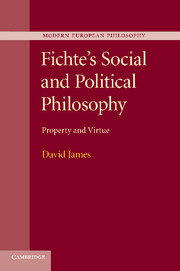Book contents
- Frontmatter
- Contents
- Acknowledgements
- List of abbreviations of Fichte's works
- Introduction
- 1 Fichte's theory of property
- 2 Applying the concept of right: Fichte and Babeuf
- 3 Fichte's reappraisal of Kant's theory of cosmopolitan right
- 4 The relation of right to morality in Fichte's Jena theory of the state and society
- 5 The role of virtue in the Addresses to the German Nation
- Bibliography
- Index
3 - Fichte's reappraisal of Kant's theory of cosmopolitan right
Published online by Cambridge University Press: 03 May 2011
- Frontmatter
- Contents
- Acknowledgements
- List of abbreviations of Fichte's works
- Introduction
- 1 Fichte's theory of property
- 2 Applying the concept of right: Fichte and Babeuf
- 3 Fichte's reappraisal of Kant's theory of cosmopolitan right
- 4 The relation of right to morality in Fichte's Jena theory of the state and society
- 5 The role of virtue in the Addresses to the German Nation
- Bibliography
- Index
Summary
In the first few years after its publication in 1795, Kant's essay Perpetual Peace (Zum ewigen Frieden) provoked intense discussion in Germany, prompting figures associated with German Romanticism such as Friedrich Schlegel and Joseph Görres to write about it. Fichte also wrote about Kant's essay, which deals with the rights of nations and cosmopolitan right while setting out to show how a lasting global peace might be possible, in the form of a review that appeared in 1796 in the Philosophisches Journal einer Gesellschaft Teutscher Gelehrten, at a time when Fichte was developing the theory of natural right that he eventually published as the Foundations of Natural Right. In the second part of this work, published in 1797, Fichte attempts to make his own contribution towards the main question with which Kant deals in Perpetual Peace, which is the question of the possibility of a peaceful global order subject to law. Fichte does this in the second appendix to the doctrine of natural right entitled, ‘Outline of the right of nations and cosmopolitan right’ (Grundriss des Völker- und Weltbürgerrechts).
As its title indicates, this appendix falls into two parts. One part concerns the rights that nations have in relation to each other in times of war and peace, while the other part concerns the idea of world citizenship and the rights that it entails.
- Type
- Chapter
- Information
- Fichte's Social and Political PhilosophyProperty and Virtue, pp. 87 - 111Publisher: Cambridge University PressPrint publication year: 2011



